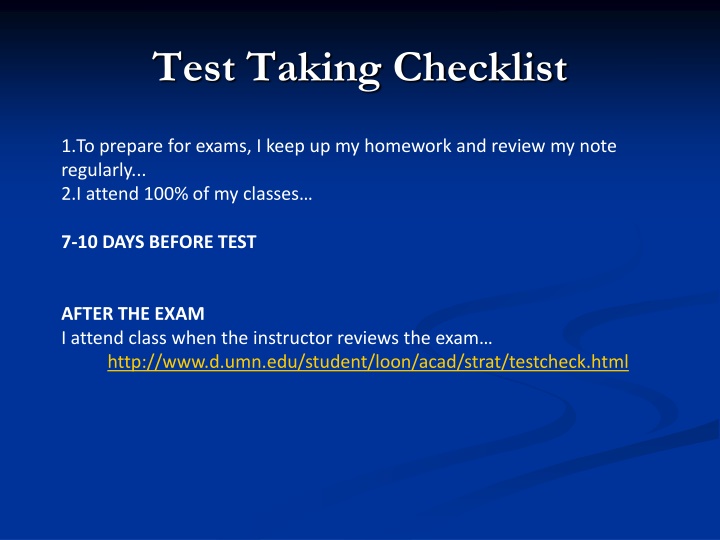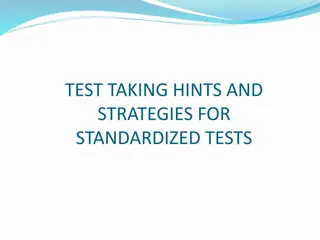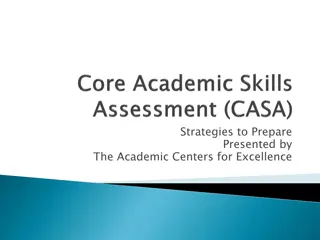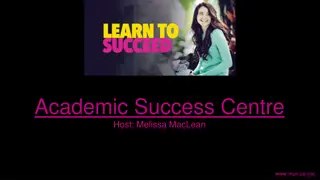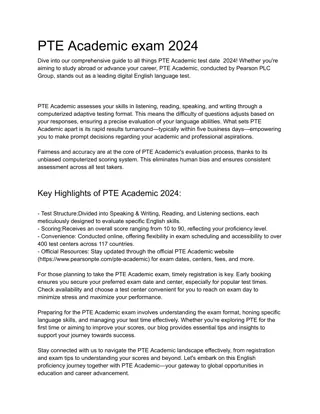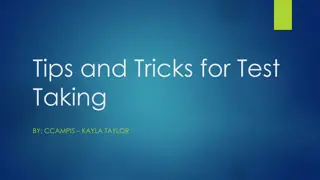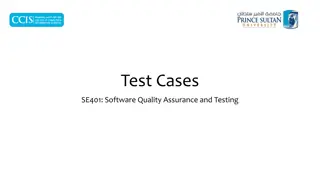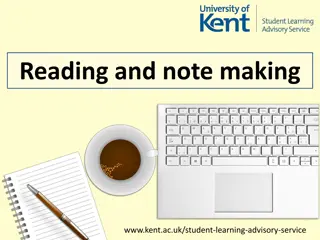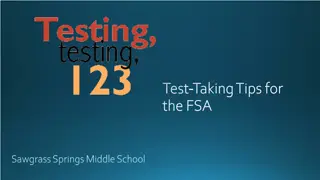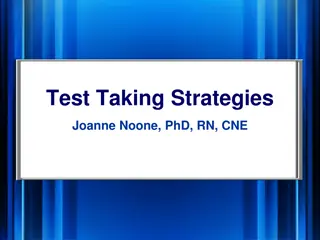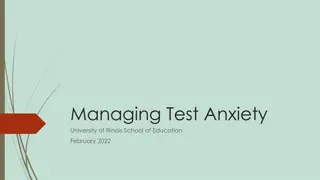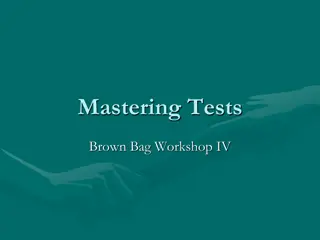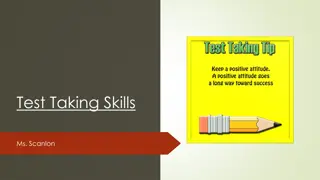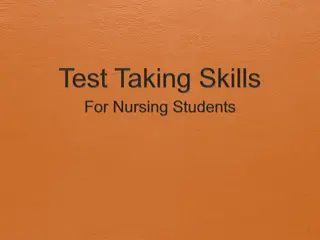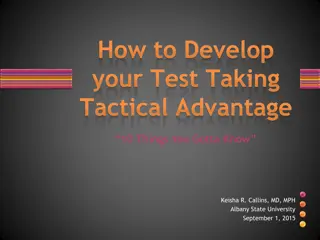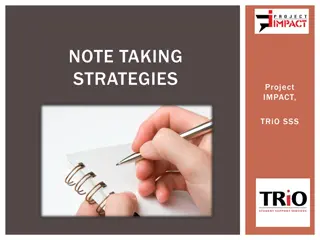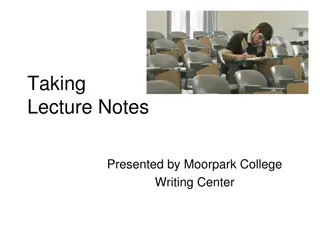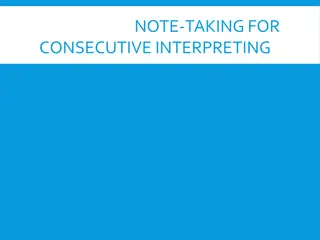Effective Test-Taking Strategies for Academic Success
Implementing effective test-taking strategies is crucial for academic success. This checklist provides detailed tips on preparing for exams, combating the forgetting curve, optimizing information retention, managing test anxiety, and excelling during the exam. By following these strategies, you can enhance your study habits, perform better in tests, and alleviate anxiety associated with exams.
Download Presentation

Please find below an Image/Link to download the presentation.
The content on the website is provided AS IS for your information and personal use only. It may not be sold, licensed, or shared on other websites without obtaining consent from the author.If you encounter any issues during the download, it is possible that the publisher has removed the file from their server.
You are allowed to download the files provided on this website for personal or commercial use, subject to the condition that they are used lawfully. All files are the property of their respective owners.
The content on the website is provided AS IS for your information and personal use only. It may not be sold, licensed, or shared on other websites without obtaining consent from the author.
E N D
Presentation Transcript
Test Taking Checklist 1.To prepare for exams, I keep up my homework and review my note regularly... 2.I attend 100% of my classes 7-10 DAYS BEFORE TEST AFTER THE EXAM I attend class when the instructor reviews the exam http://www.d.umn.edu/student/loon/acad/strat/testcheck.html
First Time with Information http://homepages.westminster.org.uk/classics/vocab/learning.htm
Before The Test Stay up-to-date on assignments. Make sure you understand the information as you are learning it. Read and study information in meaningful chunks Identify the information that was most important. Analyze past tests
Before The Test Break study sessions into manageable time segments/meaningful units. Make practice questions. Use mnemonic techniques Form a study group Get a good night's sleep before the test.
During the Test Do a quick "mind dump" of information you don't want to forget. Get to the test site early Get the big picture. Survey the entire test before you answer any questions. Relax
During the Test Read directions carefully. Ask questions if you don't understand or need clarification. Answer the easiest questions first Use good strategies for type of test you are taking Keep an eye on the clock.
Test Anxiety Control Take a few deep breaths and to relax tense muscles. Tell yourself "I can be anxious later, now is the time to take the exam." Focus on answering the question, not on your grade or others performances. Counter negative thoughts with other, more valid thoughts like, "I don t have to be perfect." If allowed, get a drink, eat something. or go to the bathroom. Ask the instructor a question. Break your pencil lead then go sharpen it.
After the Test Determine areas of strength and weakness in your test-taking skills Always analyze your tests
Look for patterns. Ask: What kinds of questions did you have the most difficulty with? Which questions were worth the most points? What can you do to improve on your next test? How can make sure you get more of the high value questions correct next time?
Ask yourself what you still don't understand Did you have difficulty understanding the instructor's comments? Write down any questions that you need to ask your instructor. Make an appointment to discuss these issues.
True/ False Tests Every part of a true sentence must be "true Pay close attention Negatives can be confusing. Qualifiers (tend to make TRUE):usually, frequently, often, sometimes, some, seldom, many much, probably, a majority, apt to, most, might, a few, may, unlikely Absolute words (tend to make FALSE): all, none, best, absolutely, always, never, worst, absolutely not, only, nobody, everybody, certainly, invariably, no one, everyone, certainly not Often T/F tests contain more true answers than false answers.
Matching Questions Examine both lists to determine the types of items and their relationships. Categorize Use one list as a starting point and the second list to find a match. Move through the entire list before selecting a match. Cross off items Do not guess until all absolute matches have been made.
Multiple Choice Eliminate options you know to be incorrect "true-false test: Question options that are totally unfamiliar to you Negative or absolute words. "All of the above:
Multiple Choice Example True/False Test Which of these is not a color? Red Yellow Blue Cat a. b. c. d. Which of these is not a color? Red Yellow Blue Cat a. b. c. d.
Short Answer Go over your notes and the assigned reading Prepare for the test If you can think of several answers A guess made with common sense
Fill-Ins Use common sense Look for clues in the sentence Pay attention to the length of the blank line or the number of blank lines Read the sentence through with your choice. Make sure it sounds right grammatically and that it makes sense. Provide a descriptive answer when you cannot think of the exact word or words.
Essay Tests Outline Introduction Develop each point Hold to your time Qualify answers when in doubt. Summarize in your last paragraph
Common Essay Words Analyze: Break into separate parts and discuss, examine, or interpret each part Explain: Make an idea clear. Show logically how a concept is developed. Give the reasons for an event. Compare: Examine two or more things. Identify similarities and differences. Contrast: Show differences. Set in opposition. Interpret: Comment upon, give examples, describe relationships. Explain the meaning. Describe, then evaluate Outline: Describe main ideas, characteristics, or events. (Does not necessarily mean "write a Roman numeral/letter outline.") Prove: Support with facts (especially facts presented in class or in the test.) SEE HANDOUT
Test taking tips & test anxiety http://www.studygs.net http://www.stmartin.edu/learningcenter/studys kills/handouts.htm (handout) http://www.counselingcenter.illinois.edu/?page _id=114 http://www.nhti.edu/learningcenter/lctestanxie ty.pdf http://www.bucks.edu/~specpop/tests.htm
Relaxation techniques http://www.mayoclinic.com/health/relaxation- technique/SR00007 http://www.helpguide.org/mental/stress_relief _meditation_yoga_relaxation.htm http://www.umm.edu/sleep/relax_tech.htm http://www.scs.tamu.edu/selfhelp/elibrary/rela xation.asp http://www.traumacenter.org/resources/pdf_fil es/Relaxation_Exercises.pdf
Test Your Skills http://ccc.byu.edu/learning/strategy.php#tf
